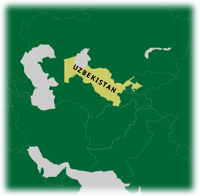 |
|
|
 Uzbekistan: Creation of an Academic Network Uzbekistan: Creation of an Academic NetworkBy Tatyana Klementieva, PERDCA, Uzbekistan tania@silk.org The emergence of computer communications in Uzbekistan in 1990 was made necessary by the importance of exchange among scientists, academics, and government structures. At that time, there was only offline connection. The Project on Economic Reforms and Development in Central Asia (PERDCA), a nonprofit organization, was created in 1993 to provide offline connection for local people free of charge. There were several sites in the main cities, with free access to offline users. The Internet first appeared in Uzbekistan in 1995. There are several Internet providers such as PERDCA, RELCOM, SOVAM, and UZPAK. Although PERDCA provides connection for offline usage free of charge, it charges for Internet connection--but only to cover telecommunication expenses. NGOs also use their Internet service free of charge. Technical issues prevent the Internet from becoming more widespread in Uzbekistan. Only 3 percent of the people in the country have access to the Internet. There are several Internet providers in Tashkent working on upgrading telecommunications equipment such as satellite dishes and fiber-optic telephone lines. On 23 July 1997, the president of Uzbekistan issued a decree entitled On Measures to Reorganize and Improve the Management of the Information Systems Sector. The decree abolished the Ministry of Communications and converted it into the Uzbek Postal and Telecommunications Agency. The main functions of the new agency, as listed in the decree, are (1) policy making, (2) streamlining the management of the sector, (3) development and supervision for industrial standards compliance, (4) promotion of market reforms in the industry, and (5) attraction of foreign investment. There is tremendous interest in exploring the Internet on the part of scientific researchers, students, and teachers. There are ministries, government institutions, factories, and private organizations among the 3 percent who use the Internet. Now, work is being done on improving connections in this field, because the number of people who are interested in using the Internet is growing steadily. The creation of an academic network, including not only universities but also NGOs, would give an opportunity to help with the ongoing economic reforms in Uzbekistan. Since the president's decree, PERDCA has been working with the Ministry of Higher Education on creation of such a network and is currently seeking funding opportunities. In my view, the Internet is important for the nongovernmental
sector because it enables those in that sector to work as a team
to solve problems in such areas as social status, ecology, and
mass media. Finding information and distributing it among nonprofit
organizations, which is the primary focus of my work, helps NGOs
develop contacts and fund their projects. Among those who have
benefited from that information are the Women's Resource Center,
Women's Social Related Project, Tashkent Association for Economic
Cooperation with Other Countries, Junior Achievement, and Center
for Children's Aesthetics and Creativity. . |

